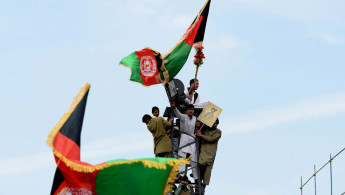Suspected Taliban gunmen kill three in eastern Afghanistan after group's flag replaced
Suspected Taliban gunmen killed at least three people and wounded 12 others in the eastern Afghan city of Jalalabad Wednesday, after opening fire into a crowd of people who had removed the Taliban's black-and-white banner and replaced it with the national flag.
The move came a day before Afghans are due to celebrate the country’s Independence Day marking the end of the British protectorate in 1919.
Video footage shared widely on social media shows alleged Taliban fighters firing in the air and using batons to disperse crowds who had gathered near the national flag, hoisted in Jalalabad's Pashtunistan Square. Local journalists were reportedly injured as they covered the events.
Reuters news agency cited witnesses and a local police officer saying that at least three people had been killed. The Taliban authorities have not commented on the matter.
Jalalabad, the capital of Nangarhar province, is a transport hub linking Kabul to Pakistan via the Torkham border crossing. It was one of the last provinces to fall to the Taliban after the provincial governor struck a to deal surrender without a fight.
Afghans demonstrate in Jalalabad in support of keeping Afghan flag (instead of white Taliban flag). Local media report Taliban fires on them, killing 2 and injured others. pic.twitter.com/mNYBUlumZ5
— Richard Engel (@RichardEngel) August 18, 2021
The Taliban have appointed Anas Haqqani, the son of the head of the US-proscribed Haqqani Network, as the governor of the Nangarhar.
The Taliban's seizure of Afghanistan has seen the contentious replacement of the national flag with the group's own banner, whose memory evokes an era of hardline fundamentalism in the minds of many Afghans.
Separately on Wednesday, Taliban forces allegedly blew up the statue of revered Hazara ethnic leader Ali Mazari. The Shia militia leader had fought against the Taliban, commanding forces of the Iran-backed Hizb-e-Wahdat, until the Taliban killed him amid a purge of militia leaders before taking power in 1996.
The site of the statue was Bamiyan province, where the Taliban notoriously destroyed 1,500-year-old Buddhist statues, claiming that they signified idol worship - the antithesis of Islamic monotheism.





 Follow the Middle East's top stories in English at The New Arab on Google News
Follow the Middle East's top stories in English at The New Arab on Google News
![The UAE is widely suspected of arming the RSF militia [Getty]](/sites/default/files/styles/image_330x185/public/2024-11/GettyImages-472529908.jpg?h=69f2b9d0&itok=Yauw3YTG)
![Netanyahu furiously denounced the ICC [Getty]](/sites/default/files/styles/image_330x185/public/2024-11/GettyImages-2169352575.jpg?h=199d8c1f&itok=-vRiruf5)
![Both Hamas and the Palestinian Authority welcomed the ICC arrest warrants [Getty]](/sites/default/files/styles/image_330x185/public/2024-11/GettyImages-2178351173.jpg?h=199d8c1f&itok=TV858iVg)